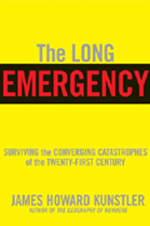Kunstler's View on Oil Prices
 When the price of oil hit $58 a barrel a couple of weeks ago, I was all set to put a post up discussing how unlike previous periods where the price of oil spiked, the fundamentals of this episode were different (remember, this blog is all about identifying factors the lend evidence to our contention that the conventional dynamics about workplace will change). I was going to say that unlike other periods, where the price inevitably went down when OPEC nations simply upped the production levels, we were now dealing with the new phenomenon of demand from India and China (over 2 billion people that never really factored into the equation before their combined economic engines started churning) which would create an entirely new dynmanic - if these two ever actually join forces, their combined might will not only tilt the balance of economic power, but will only accelerate the stresses associated with a limited supply of fossil fuel. My intention was to sound very smart, but this wasn't really meant to be, because our old friend James Howard Kunstler beat us to the punch.
When the price of oil hit $58 a barrel a couple of weeks ago, I was all set to put a post up discussing how unlike previous periods where the price of oil spiked, the fundamentals of this episode were different (remember, this blog is all about identifying factors the lend evidence to our contention that the conventional dynamics about workplace will change). I was going to say that unlike other periods, where the price inevitably went down when OPEC nations simply upped the production levels, we were now dealing with the new phenomenon of demand from India and China (over 2 billion people that never really factored into the equation before their combined economic engines started churning) which would create an entirely new dynmanic - if these two ever actually join forces, their combined might will not only tilt the balance of economic power, but will only accelerate the stresses associated with a limited supply of fossil fuel. My intention was to sound very smart, but this wasn't really meant to be, because our old friend James Howard Kunstler beat us to the punch.In a recent issue of Rolling Stone, Kunstler discusses some of the themes put forth in his new book The Long Emergency: Surviving the End of the Oil Age, Climate Change, and Other Converging Catastrophes of the Twenty-first Century, published by Atlantic Monthly Press. In it, he not only talks about the India/China theme, but puts it into a far more elegant framework than I could have ever come up with (but hey, he's one of the best, so I'm okay). More importantly (to this forum at least), Kunstler talks about the kind of communities that stand the best chance of surviving over the longer term:
The successful regions in the twenty-first century will be the ones surrounded by viable farming hinterlands that can reconstitute locally sustainable economies on an armature of civic cohesion. Small towns and smaller cities have better prospects than the big cities, which will probably have to contract substantially. The process will be painful and tumultuous. In many American cities, such as Cleveland, Detroit and St. Louis, that process is already well advanced. Others have further to fall. New York and Chicago face extraordinary difficulties, being oversupplied with gigantic buildings out of scale with the reality of declining energy supplies. Their former agricultural hinterlands have long been paved over. They will be encysted in a surrounding fabric of necrotic suburbia that will only amplify and reinforce the cities' problems.
If you haven't read one of Kunstler's books, particularly the ones dealing with urbanism, do yourself a favor and read one. Kunstler is extremely thought-provoking, and has a wit that is singularly unique. I can also say that he has inspired much of the work we have done since our inception. Enough talking here, I'm off to buy a copy of the book.
1 Comments:
More evidence for the increasing value of secondary nodes. The thesis still stands, and seems ever stronger. The question now is whether I should be packing my bags and heading for Kingston, or desperately trying to tell Torontonians to change things before it's too late. Or is it already too late? Another great post Tony.
By Anonymous, at Sat Apr 30, 12:40:00 PM EDT
Anonymous, at Sat Apr 30, 12:40:00 PM EDT
Post a Comment
<< Home